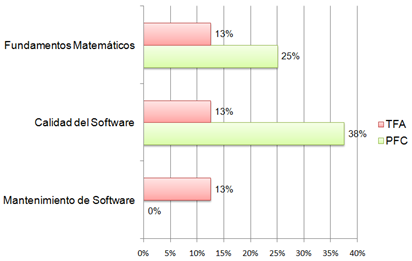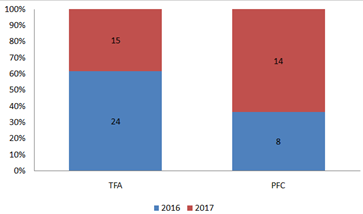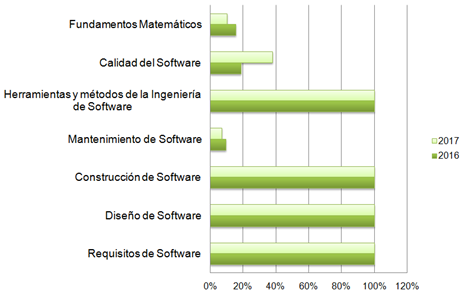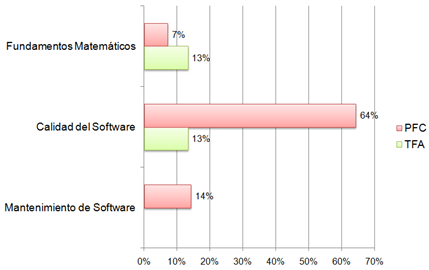Mi SciELO
Servicios Personalizados
Articulo
Indicadores
-
 Citado por SciELO
Citado por SciELO
Links relacionados
-
 Similares en
SciELO
Similares en
SciELO
Compartir
Mendive. Revista de Educación
versión On-line ISSN 1815-7696
Rev. Mendive vol.18 no.2 Pinar del Río abr.-jun. 2020 Epub 02-Jun-2020
Original article
Disciplinary knowledge Contributions from the university to the Software Industry
1 Departamento de Informática. Facultad de Ciencias Exactas y Naturales y Agrimensura. Universidad Nacional del Nordeste. Argentina
The computer science discipline presents different evidences about theoretical and empirical approaches. Thus, studies treated from evidence-based software engineering or ISBE, provide a logical and methodological approach. In this paper, the approach from the Software Engineering and, in particular, the treatment focused on the SWEBOK guide, shows how some of these areas are represented in the final graduation works defended by the students of the Bachelor of Information Systems in the 2016 and 2017 years, in Argentina. In the paper, the method based on the ISBE is exposed, and the materials under study were the final student productions. The results show the predominance of one of the knowledge areas of the SWEBOK guide. These findings could be explained by the curricular line assumed from the career, treated and deepened in this space of professional and personal training, the previous knowledge recovered from other subjects and the demands of the context. Therefore, results demonstrate the relevance of strengthen the networks with external organizations.
Key words: education; computing; computer evidence; graduation production, SWEBOK; software engineering
Introduction
In university settings - through the functions of teaching, research, extension and transfer of knowledge - the relationship with the state and industry is constantly promoted.
In Argentina, several laws that promote the Information Technology and Services Sector (SSI). These include the Software Industry Law (2004) and the Knowledge Economy Law. (Argentina. Ministerio de Producción y Trabajo, 2019).
The Law Promotion of Industry of the Software, (Ministerio de justicia y Derechos humanos, 2004), defines the field of application and scope and treatment tax for the sector. In addition, things related to imports, the Trust Fund for the Promotion of the Software Industry (FONSOFT), the infractions and penalties.
Law 27.506 -The Promotion of Economy Knowledge Regimen - passed in 2019, will be in effect from the 1st January 2020 until 31 December of 2029 (Argentina. Parlamento argentino, 2019). It "seeks to create 215,000 quality jobs and generate 15,000 million dollars of annual exports by 2030" (Knowledge Economy Law, 2019). This is how it is to strengthen those "productive activities that are characterized by the intensive use of technology and that require highly qualified human capital"(Argentina. Ministerio de Producción y Trabajo, 2019).
Among the activities that benefit from the Law of Knowledge Economy (2019) software and the computer and digital services are mentioned. (Argentina. Ministerio de Producción y Trabajo, 2019)
Software Engineering (IS) is one of the disciplines of Computer Science (Red de universidades con carreras en Informática, 2014), includes aspects of software production from the initial stages of the specification of a system, to the maintenance and after its implementation (Sommerville, 2011).
In disciplines such as Computer Science, the evidence occupies a predominant place and supports studies with technological approaches of the scientific method (Giró, Disderi and Zarazaga, 2016;Mariño and Alfonzo, 2019). Software Engineering relies on methods proposed from other disciplines to address their studies. One of them is the so-called Evidence Based Software Engineering or ISBE.
Kitchenham, Budgen and Brereton (cited inGenero, 2016, p. 2) state that Evidence Based Software Engineering (ISBE) provides " the means by which the best current research evidence can be integrated with practical experience and human values in the decision-making process about software development and maintenance. "
Kitchenham, Budgen and Brereton (2015, p. 209) mention that the research based in the evidence is more than an academic practice. It is a contribution to discipline and practice in IS:
It allows organizations to make evidence-based decisions about the adoption of policies related to software development and acquisition.
Provides useful guidance on good practices.
Aim the work of the standard body.
Vijayet al.(2008, p. 1) state that the ISBE as a methodology adopts the following steps:
Turn the need for information into an answerable question and look for the best available evidence for its validity, impact and applicability.
Integrates the evidence assessed for evaluation and performance improvement.
Dunkel and Godel (2015) argue that even when there are several works and events that contribute to empirical Software Engineering, it should be recognized that the evidence must be contextualized, so "what is convincing for someone may not be for others" (p.25). InMariño and Alfonzo (2019) the proposed Genero (2016) applying intends to expand engineering the Based Software Evidence as a method of empirical study to create a knowledge that can improve the practice of Informatics and thus demonstrate which are the contributions from the Higher Education spaces to the Software Industry.
The SWEBOK (Software Engineering Body of Knowledge) guide, as its body of knowledge, provides the foundations for the development of the computer and digital software and services sector. This guide comes from the joint work of professional associations such as the Electrical and Electronics Institute of Engineers and the Association for Computing Machinery. The SWEBOK V3.0 version features updates in all areas of knowledge (KAS, for its acronym in English) and reflects changes in Software Engineering treated in SWEBOK 2004 guide.
SWEBOK is considered a standard discipline.Bourque and Fairley (2014) mention among some of their characteristics:
Characterize the contents of Software Engineering.
Provide access through the themes to the set of knowledge of Software Engineering.
Promote a consistent vision of Software Engineering worldwide.
Clarify the position of Software Engineering with respect to other disciplines, such as Computer Science or Mathematics.
Provide a basis for curriculum development and the creation of certification materials.
This guide exposes 15 areas of knowledge, identified as: software requirements, software design, software construction, software testing, software maintenance, software configuration management, software engineering management, software engineering process, models and methods of software engineering, software quality, professional practice of software engineering, economics of software engineering, computer fundamentals, mathematical foundations, engineering fundamentals.
The Network of universities with careers in Computer Science (2019) (RedU NCI) defines terminals or curricula. In the Faculty of Exact and Natural Sciences and Surveying (Fa CENA) of the National University of the Northeast, the disciplinary training corresponds to the License in Information Systems (LSI).
The bachelors are characterized by requiring on students develops a thesis to obtain the degree. The subjects Work Final Application (TFA) and Final Project (PFC) are respectively included in the Plan 1999 and the Plan 2009 Career Degree in Information Systems.
The primary objective of the subjects mentioned is to complete the academic training and professional students, enabling the integration and use of knowledge acquired during their years of study for solving problems such professional, academic and scientific (Mariño and Alfonzo, 2019).
In this context, the career completion paths constitute an opportunity to fulfill this mission of the University towards society, with which it is committed. It should be clarified that, in particular, the Computer Services and Systems Sector has specialized human resources in disciplinary matters according to their preferences reflected in the themes chosen by them.
In this paper, we study how the areas of knowledge defined by the SWEBOK guide are evidenced - explicitly or implicitly - in the productions defended in the years 2016 and 2017 in the framework of the subjects Final Application Work and Final Career Project of the students of the Degree in Systems from the National University of the Northeast (UN NE), Argentina, and thus to access to the degree.
Materials and methods
This study was treated with an interpretive epistemological perspective. That is, the areas of knowledge of the guide SWEBOK that explicitly or implicitly - are addressed by students to design and implement the project completion career of Bachelor of Information Systems at the National University of the Northeast, Argentina were relieved.
Following the proposal ofMariño and Alfonzo (2017), the process of empirical research on graduation projects developed for the collection and presentation of the results is exposed. It should be clarified that the results of the study obtained from E caps 3 and 4 are detailed in the "Results" section.
An exploratory analysis was developed and opted for primary methods, since the studies were carried out on student productions graduates in the years 2016 -2017.
Stage 1. Definition
The objective of the investigation is defined: to establish the areas and topics of interest of the students in relation to the aspects treated by the SWEBOK Guide. Following Genero (2016, p. 5) "working with scientific evidence instead of assumptions will allow software development to become a true engineering discipline." Therefore, the purpose is to obtain information regarding the application of the knowledges in solving problems and defendants reflected in the graduation productions framed in subjects TFA / PFC.
The final reports - primary sources - reflecting the theoretical and empirical production produced by LSI graduate students were established as the universe of the study. The sample size was established in 32 and 29 productions for the 2016 and 2017 school cycles, respectively. This information was complemented with those obtained from a database managed by the aforementioned subjects. In the data processing, an electronic spreadsheet was used.
Stage 2. Experimental design
It was established as a research question that guides the work, what is the preference in areas of knowledge of the SWEBOK guide treated by students for the development of their graduation work?
In addition, this question is supplemented from the Engineering Software based in evidence indicating "what works, for whom, where, when and why".
These questions guide the definition of variables to obtain from the selected works:
What is what works: the product
For whom: the recipient, represented by companies, government organizations, environmental organizations, subjects demanding information technologies and their products
Where: the location of the implementation
When: the period of inquiry defined, in this case for the years 2 016 and 2017
Why: the foundation that underpins technological development.
They are complemented with aspects:
Technical: technologies, complexity or defined systems ;
Social: individual ability (for example, the ease with which students identify a problem or from an approach they transform it into a graduation project), student autonomy in selecting the areas and topic of development of the thesis project ;
Environmental: possibility of transferring the product to the applicants organizations, or enter the market with the IT.
It is defined asvariables of interest:SWEBOK guide area represented in the end of degree productions. In addition, it states:
When: study focused on the years 2016 and 2017
Where: the subjects PFC / TFA the Degree in Systems career, FACENA, UNNE
Under what circumstances: theses produced by the students under the supervision of a guidance teacher and the aforementioned staff. It should be clarified that students can select the area and subject in which to develop the work, which could implicitly be considered as a preferred area for future professional development.
Stage 3. Driving and analysis
The study focused on processing, data reduction and the generation of descriptive statistics concerning the evidences studied was carried out. The results were analyzed as activity prior to interpretation and reporting.
Stages 4 and 5. Interpretation of the results and report
Modeled analysis of projects from real situations and defended in the Period 2016 -2017, can identify: that areas of knowledge of the guide SWEBOK is addressed in the work of graduation concretized in the study Period.
Referring to the limitations mentioned in the study period concerning the years 2016 and 2017. It should be clarified that the inquiry can be replicated to other years.
Results
Empirical research discussed in this article was addressed from the Engineering Software, since projects are concrete with a software product or with the use of some tools of the market that fits to propose solutions focused on solving specific problems; these corresponded with some of the areas of knowledge of Engineering Software covered in the guide SWEBOK.
As seen in thefigure 1, and in the years 2016 and 2017 the defense of 24 and 15 jobs respectively, included in the subject Work Final Application (TFA) of the LSI 1999 plan were concreted. In the mentioned period, eight and fourteen productions belonging to the Final Project Project (PFC) of the 2009 LSI plan were defended.
The analysis of the results of research (figure 2) showed that the areas of "Software Requirements", "Design of Software" and "Software Construction" guide SWEBOK is represented in all of the technological solutions advocated in the 2016 and 2017 school year. Inclusion is argued since all technological solutions begin with the capture of requirements, which are obtained by students as a preliminary step to the design and the development / construction of a solution. Specifically, they are incorporated in the "Method" chapter or in a section of the "Results" chapter, depending on the approach of each production. On the other hand, this knowledge treatment accounts for the integration of knowledge previously treated in other subjects of the curriculum and contributes to the general fulfillment of the completion of the TFA or PFC, being decisive in the generation of the solutions.
In this regard, the application highlights issues related to the area oftools and methods of Software Engineering(100 %, figure 2), being cross- sectional area to full development of the report graduation, incorporated in the chapter " Method "and" Tools”.
On the other hand, they were detected and analyzed productions that address as an object of study treatment set of issues addressed by other areas, such as those concerning to Maintenance Software, Quality of the Software and Mathematical Foundations.
Infigure 3representativeness of the solutions is displayed, considering the areas of the guide SWEBOK and differentiating those corresponding to the PFC and TFA. It is observed that of the total productions defended (100 %) in 2016, the area of knowledge identified as Software Quality and Mathematical Foundations has issues addressed by both subjects and, to a lesser extent, Software Maintenance, mainly focused on TFA In this regard, the figure 4percentage defenses concretized in 2017 are presented.

Fig. 3 - Percentage distribution according to knowledge areas and curriculum. 2016 period at FaCENA, UNNE
Discussion
The universities demonstrate their substantive functions through teaching, research, extension and transfer of knowledge, and in some cases also reflected in products and services. The results of this research contribute to these dimensions, given that knowledge is generated around the training of university students who are inserted in the Software Industry, even before graduating as detected and mentioned inLópez y Ramos (2018).
The present study, developed at the National University of the Northeast, as set forth in Mariño and Alfonzo (2017) and Mariño and Alfonzo (2019), creates knowledge about technological productivity from higher education spaces. Particularly, the specialties identified in the SWEBOK guide that students select - explicitly or implicitly - were considered to develop their graduation work, knowledge that is applied and specializes in the SSI.
It is noteworthy that the knowledge and skills acquired in previous subjects affect the decisions of the students regarding the areas of the SWEBOK guide that they select as the object of study in the final course. This knowledge is deepened and updated as delimited approaches in the aforementioned work student and in some cases may be influenced by their work performance in an organization or as independent developers, contributing to the industry of the Software and to the Economy of Knowledge.
In addition, the social-techno-productive role that the University assumes in the 21st century in connection with industry, government or enterprises, is a factor to be considered in public policies that are strengthened with these technological products aimed at resolving problems of different order: local, regional, national and international, also discussed in López and Ramos (2018). Inference to be addressed in future investigations.
The findings reported in this article are understood in what Dunkel and Godel (2015, p. 30) identify as "experience of researchers who can provide more information on the practical application of technologies". In particular, it adopted the engineering of the Software based in the evidence, as a methodology that identifies and systematize from productions degree the contribution of technological solutions designed and developed to solve specific problems, at the time the students, starting their Specialization path in Computer Science as a scientific-technological discipline.
Following the statement in Madeyski, Kitchenham and Wnuk (2018), the application of Empirical Software Engineering stimulates knowledge, discussion and the adoption of solutions that can improve credibility in research in this disciplinary area; and in particular adopting this knowledge to improve professional practice contributing to the university-industry-government relationship.
Acknowlegments
This work was developed within the framework of the project IT and Information Systems: models, methods and tools accredited by the General Science and Technical secretary of the National University of the Northeast
REFERENCES
Argentina. Ministerio de justicia y Derechos humanos. (2004). Ley de promoción de la industria del software. Ley 25.922. Argentina: Ministerio de justicia y Derechos humanos. Recuperado de: http://servicios.infoleg.gob.ar/infolegInternet/anexos/95000-99999/98433/norma.htm [ Links ]
Argentina. Ministerio de Producción y Trabajo. (2019). Ley de la Economía del Conocimiento. Argentina: Ministerio de Producción y Trabajo. Recuperado de: https://www.argentina.gob.ar/noticias/el-congreso-aprobo-la-ley-que-promueve-la-economia-del-conocimiento [ Links ]
Argentina. Parlamento argentino. (2019). Régimen de Promoción de la Economía del Conocimiento. Ley 27.506. Argentina: Parlamento argentino. Recuperado de: http://www.parlamentario.com/db/000/000759_ley_de_edc_8.3.19.pdf [ Links ]
Bourque, P. y Fairley, R. E. (2014). SWEBOK Guide to the Software Engineering Body of Knowledge, Version 3.0. IEEE Computer Society. Recuperado de: https://www.computer.org/education/bodies-of-knowledge/software-engineering [ Links ]
Dunkel, A. y Gödel, A. (2015). Búsqueda de evidencia convincente en los estudios de Ingeniería de Software, RACCIS, 5(1), pp. 25-31. [ Links ]
Genero, M. (2016). Ingeniería del software basada en la evidencia. Escuela Superior de Informática, Universidad de Castilla-La Mancha: España. [ Links ]
Giró, J. F., Disderi, J. y Zarazaga, B. (2016). Las causas de las deficiencias de la Ingeniería de Software. Ciencia y Tecnología, 16, pp. 69-80. [ Links ]
Kitchenham, B., Budgen, D. y Brereton, P. (2015). Evidence-Based Software Engineering and Systematic Reviews. CRC Press. Recuperado de: https://www.crcpress.com/Evidence-Based-Software-Engineering-and-Systematic-Reviews/Kitchenham-Budgen-Brereton/p/book /9781482228656 [ Links ]
López, A. y Ramos, A. (2018). El sector de software y servicios informáticos en la Argentina. Evolución, competitividad y políticas públicas. Argentina: Fundación CECE. Recuperado de: http://fcece.org.ar/wp-content/uploads/informes/software-servicios-informaticos-argentina.pdf [ Links ]
Madeyski, L., Kitchenham, B. y Wnuk, K. (2018). Introduction to the special section on Enhancing Credibility of Empirical Software Engineering. Information and Software Technology, 99, pp. 118-119. [ Links ]
Mariño, S. I. y Alfonzo, P. L. (2017). Ingeniería de software basado en evidencia: soportes como producto académico. Enl@ce Revista Venezolana de Información, Tecnología y Conocimiento, 14(1), pp. 50- 68. [ Links ]
Mariño, S. I. y Alfonzo, P. L. (2019). Las áreas de conocimiento Swebok en producciones de graduación. Un estudio de la disciplina Informática en la Facultad de Ciencias Exactas y Naturales y Agrimensura (FaCENA) de la Universidad Nacional del Nordeste (UNNE), Argentina. e-Ciencias de la Información, 9(2), DOI: 10.15517/eci.v9i2.35553 [ Links ]
Red de Universidades con Carreras en Informática. (2019). Carreras de grado en informática. Propuesta de Currícula. Argentina: RedUNCI. Recuperado de: http://redunci.info.unlp.edu.ar/docs/propuesta.doc [ Links ]
Sommerville, I. (2011). Ingeniería de software. Pearson Educación: Madrid, España. [ Links ]
Vijay, K., Nangia, A. Q., Ansari, A. B, Shilpi, J., Sunanda, C. y Tapasya, P. (2008). Applications of evidence based software engineering for IT systems, Review of Business and Technology Research, 1(1), pp. 1-7. [ Links ]
Received: January 16, 2020; Accepted: February 27, 2020











 texto en
texto en 





